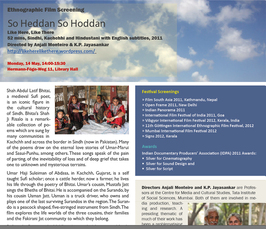"Ethnographic Film Screening: So Heddan So Hoddan"
Ethnographic Film Screening 2012
- Date: May 14, 2012
- Time: 02:00 PM - 03:30 PM (Local Time Germany)
- Location: MPI-MMG, Hermann-Föge-Weg 11, Göttingen
- Room: Library Hall

For more details please contact vdvoffice(at)mmg.mpg.de.
So Heddan So Hoddan
Like Here, Like There
52 mins, Sindhi, Kachchhi and Hindustani with English subtitles, 2011
Directed by Anjali Monteiro & K.P. Jayasankar
http://likeherelikethere.wordpress.com/
Shah Abdul Latif Bhitai, a medieval Sufi poet, is an iconic figure in the cultural history of Sindh. Bhitai’s Shah Ji Risalo is a remarkable collection of poems which are sung by many communities in Kachchh and across the border in Sindh (now in Pakistan). Many of the poems draw on the eternal love stories of Umar-Marui and Sasui-Punhu, among others. These songs speak of the pain of parting, of the inevitability of loss and of deep grief that takes one to unknown and mysterious terrains.
Umar Haji Suleiman of Abdasa, in Kachchh, Gujarat, is a self taught Sufi scholar; once a cattle herder, now a farmer, he lives his life through the poetry of Bhitai. Umar’s cousin, Mustafa Jatt sings the Bheths of Bhitai. He is accompanied on the Surando, by his cousin Usman Jatt. Usman is a truck driver, who owns and plays one of the last surviving Surandos in the region. The Surando is a peacock shaped, five-stringed instrument from Sindh. The film explores the life worlds of the three cousins, their families and the Fakirani Jat community to which they belong.
Before the Partition the Maldhari (pastoralist) Jatts moved freely across the Rann, between Sindh (now in Pakistan) and Kutch. As pastoral ways of living have given way to settlement, borders and industrialisation, the older generation struggles to keep alive the rich syncretic legacy of Shah Bhitai, that celebrates diversity and non-difference, suffering and transcendence, transience and survival. These marginal visions of negotiating difference in creative ways resist cultural politics based on tight notions of nation-state and national culture; they open up the windows of our national imaginary.